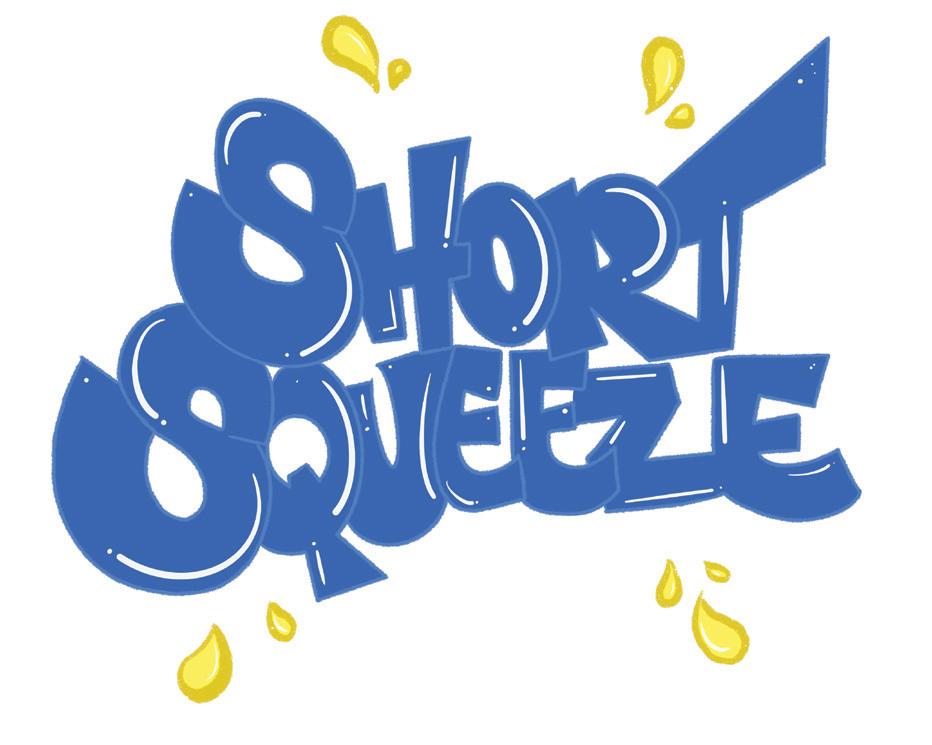
10 minute read
Taking Stock of GameStop
How an underground troop of retail investors disrupted Wall Street
Story by Justin Vuong Illustrations by Bobby Ramirez
Advertisement
In the span of one wild week, a sinking video game retailer called GameStop absurdly became valued at $24 billion, twenty times more than Bank of America. GameStop sells physical video game discs in brick-and-mortar stores. In a world going digital, most investors thought GameStop would eventually go out of business.
Instead, on Jan. 27, 2021 GameStop stock (ticker symbol GME) closed the trading day at $347.51 a share, up from $39.12 one week prior. Stories of amateurs making thousands of dollars abounded through social media, inspiring others to jump in and try winning in the stock market.
There are two basic strategies in the markets: long and short. A long strategy means buying shares, waiting for them to go up, then selling them. As the cliché goes: “Buy low, sell high.” A short strategy is the opposite. It means selling shares first, waiting for them to go down, then buying them back. In other words, sell high, buy low.
Individual investor Keith Gill has been a GameStop supporter since late 2019, bucking most investors’ predictions. On Reddit.com, an online forum, he goes by the username DeepFuckingValue. He posted his gains and losses on a Reddit subforum called WallStreetBets. One of these posts featured him wearing aviator glasses and holding a cigar. On his Youtube channel, Roaring Kitty, he uploaded a spoof video titled “Selecting Stocks Based on Feel,’’ explaining how he invests

in the stock market using a Magic 8 Ball, Uno Cards, Bananagrams pieces, and of course, his feelings. Beneath the antics though, he performed extensive research and seriously considered GameStop a promising investment.
When GameStop exploded, he turned out to be right — or just lucky. The GameStop surge is unusual. Investors typically expect to wait years for a company’s value to double. GameStop’s value soared 888% in a week, and Gill made millions.
“GameStop didn’t suddenly have a huge increase in sales because they started selling a new product that was doing really well,” says Carole Meagher, Professor of Business at City College of San Francisco.
Instead, a new force sparked GameStop’s steep and sudden rise. Coordinating their actions on social media, ordinary people outside Wall Street firms, often referred to as retail traders, whimsically instigated this buying rally. “They were running the stock up and having fun with it,” Meagher says.
Retail investors also targeted the stocks of AMC Theaters, Nokia, and Blackberry, among others. These stocks are called “meme” stocks because Redditors (people who post on Reddit) communicate about them using goofy memes, which are doctored images containing text against comedic backgrounds. The Redditors galvanized themselves around phrases like “Apes Together Strong.” They commonly refer to themselves as apes.
In addition to Reddit, the GameStop price hike is attributed to Robinhood, a stock trading brokerage firm, whose mission is to democratize investing. Established Wall Street brokerages like Schwab and E-Trade had been charging about $5 per transaction for years through an upfront commission. Starting in 2013, Robinhood pioneered zero-commission trading, which means they do not charge a fee for trading.
Instead, Robinhood makes money by routing customers’ orders to large finance firms to fill. They then pay Robinhood a referral fee of sorts. The firms mark up the orders fractionally, so they profit off each one too.

Robinhood markets themselves to individual investors. Offering zero commissions and no account minimums, they make stock trading accessible to “little guys,” ordinary people like City College students who may have only a few hundred dollars to invest. Even the folklore of Robinhood alludes to the theme of stealing from the undeserving rich and giving to the deserving poor.
For many Redditors, the undeserving rich are Wall Street’s large institutional investors called hedge funds. Melvin Capital is a hedge fund that was significantly short GameStop, meaning they had sold their shares and betted the price of GameStop would go down. “You have potentially unlimited losses when you short,” says Mario Yrun, City College business instructor of accounting and finance. “That’s not for us (individuals), but there are hedge funds that specialize in it (shorting), and that’s fine.”
Many Redditors took offense at Melvin Capital potentially profiting off the decline of GameStop, a legacy video game store they cherished.
However, Yrun believes shorting is healthy. “People should be able to express the view that a firm is overrated with the same rights as buyers can express the view that the firm is underrated. That’s ultimate democracy,” he says.
Nonetheless, starting around Jan. 20, when the “apes” of Reddit learned of their short position on GameStop through social media, Melvin Capital became a target. Fueled by mischievousness, greed and a revulsion of the wealth inequality in the United States, which they blamed on

an unscrupulous Wall Street, the chatter on Reddit’s WallStreetBets for an overdue comeuppance began fomenting. Retail investors started buying GameStop with vengeful abandon and inspired stupidity. “They didn’t care if they lost money, so that’s really irrational,” Meagher says.
Through social media, word got around, including at City College. “I had a couple of friends ask me, ‘Did I invest in GameStop?’” says Anson Seto, a City College business student.
Out of fear of missing out on this trend, other retail investors began buying even if they did not understand stock investing.

“As humans, we try to be around situations that everyone else is doing,” Seto says. “Rather than taking an educated standpoint, we just hop on the bandwagon.” He did not buy GameStop, but thousands of other individual investors did, pushing the price up.
With GameStop soaring each day as the week progressed, more investors saw an opportunity to make quick money.
When shorters are pressured to close their positions because of a large upward price movement caused by relentless buying pressure, it is called a short squeeze. Melvin Capital was caught in a short squeeze and their buying pushed the price up even further.
GameStop was skyrocketing with no end in sight and investors were manic. Then, at the peak of this frenzy on Jan. 28,


“That’s why I don’t like this idea of the GameStop stock. … it becomes gambling rather than investing,” Seto says.
A former server at a restaurant, he believes hard work should be the basis for achieving wealth. Nevertheless, the get-rich-quick mentality took hold, and GameStop continued to surge.
Other hedge funds, seeing the upward momentum of the stock, joined the party. “The huge increase in price cannot solely be attributed to all these Reddit participants on Robinhood or any other exchange,” Yrun says. Their buying pushed the price up as well.
As it climbed to bizarre and dizzying heights, shorters of GameStop like Melvin Capital were seeing their positions go deeper and deeper into the red. They hastened to buy back their shares and cut their losses, much to the satisfaction of the Redditors. “You can’t deny the likeability of screwing a hedge fund,” Yrun says. Robinhood shut down buying GameStop on their platform. Selling was still permitted, but buying was not. No buying meant no demand. And with no demand, the stock price plummeted.
Retail investors were outraged at Robinhood. Although Robinhood stated on their website that they acted out of necessity to meet regulatory financial requirements, many customers saw their actions as evidence of a rigged market.
“I don’t think so,” Seto says. “But coming from the retail investor side, it does seem kind of timed.” Keeping an open mind, Seto sees how the hedge funds consider themselves victims of a mob. “Retail investors screw them (hedge funds) for no purpose just because they don’t like the idea of them,” he says.
“I don’t think they (Melvin Capital) deserved it,” Meagher says. “I certainly think what happened to them was definitely a streak of bad luck.”
The suspicion of market manipulation by hedge funds prompted a government hearing. On Feb. 18, Gill and Melvin Capital CEO, Gabriel Plotkin, testified to a House Committee. Steve Huffman, Reddit CEO; Keith Griffin, CEO of Citadel, another hedge fund involved in the GameStop controversy; and Jennifer Schulp, a financial markets expert, testified as well.
Plotkin testified that Melvin Capital had closed its short position in response

to the rapid rise of GameStop. According to CNBC, Melvin Capital reported closing its short position at an enormous loss. The exact amount of their loss is unclear.
Gill testified to the ability of social media to increase the transparency and availability of information. “Hedge Funds and other Wall Street Firms have teams of analysts working together to compile research and analyze shares of companies. Individual investors do not have those resources. Social media platforms like Reddit, Youtube, and
Twitter are leveling the playing field,” he said.
Gill went on to say that his earnings would “go such a long way” for his family. Even though the price of GameStop deflated back to about $40 per share at the time of the hearing from its nearly

$350 peak, Gill still considered it a good investment.
“I continue to believe that GameStop has the potential to reinvent itself as the ultimate destination for gamers within the thriving $200 billion gaming industry,” he said. The very next day after the hearing, Gill posted on WallStreetBets a doubling down of his long position; he purchased 50,000

more shares of GameStop. A month after the hearing, he turned out to be right — or just lucky — again. It shot back up to about $200 per share, and at the time of publication was trading at $162.20. The hearing made apparent the significance of social media. “The Reddit platform allowed a bunch of investors to conglomerate and have a lot of power,” Yrun says.
After the hearing, the House did not charge Robinhood with any misconduct although private investors have since filed federal lawsuits according to CNN. No new regulations have yet to be considered.
Alongside all the glorious David-vs.Goliath GameStop stories on Reddit are many cautionary tales of financial losses. Overcome with optimism, some bought when the price was high and lost when GameStop dropped. They posted on WallStreetBets their losses, sometimes hundreds of thousands of dollars.
“You never really know if a stock is going to drop or not. … so if I’m putting money into the stock market, that’s money that

I’ve already lost,” Seto says. The GameStop saga is a sobering reminder that the stock market is a risky arena. Regarding investing in volatile stocks like GameStop, Yrun is against it. “Treat it as if you would be having fun going to Vegas. If you want to chase a company like GameStop, go for it. But it’s very likely it’ll end badly.” He then recounted a student in his accounting class who said he lost $2,000 on GameStop and shuddered. “Don’t do it.”
Both Meagher and Yrun recommend investing in low-cost index funds. For example, the S&P 500 index measures the performance of the largest 500 companies in the U.S. economy. “The very best thing you can do for a long-term goal is to take that stock percentage of your portfolio, put it into an index fund that mirrors maybe the S&P 500 and leave it alone for 30 years,” Yrun says.
Meanwhile the apes of Reddit that instigated GameStop’s price spike continue to stand together strong with fellow apes — literally.
They began adopting gorillas like Ishimwe, an infant mountain gorilla in Rwanda, and Segasira, a silverback in the Democratic Republic of Congo. They are protected by the Dian Fossey Gorilla Fund, the world’s longest-running and largest organization dedicated solely to gorilla conservation. Through their symbolic adoptions, they have donated more than $350,000 according to the BBC.
And whether villainous, heroic, or just plain stupid, retail investors on social media have changed the game. Nobody knows what the next GameStop will be, but one thing is for sure: There is a new player on Wall Street to watch out for — We the People.







